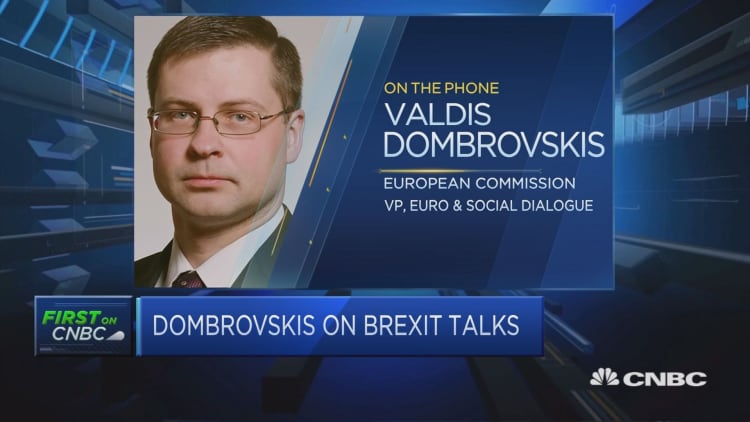
The European Union announced fresh measures on Wednesday to further integrate the euro zone and assist members in joining the group's monetary union, the euro.
European Commission Vice President Valdis Dombrovskis, who also serves as the European Commissioner for the Euro and Social Dialogue, presented the contours of a package for the completion of Europe's Economic and Monetary Union (EMU) in an interview with CNBC from Brussels.
"We are currently proposing … How we can support the preparatory work and necessary reforms in those countries wishing to join euro zone," Dombrovskis said on Wednesday.
"And by this we are showing that euro zone should be enlarging, and the commission is ready to assist those member states working on this to ensure that they can be prepared to join the euro zone and can prosper within the euro zone."
Europe's Economic and Monetary Union represents the group of policies aimed at converging EU member states' economies through coordination of economic and fiscal policies and use of a common currency, the euro.
EU leaders are putting special emphasis on reform as well as on deepening the union's cooperation at a time of rising discontent and populist rhetoric across Europe.
Amid the EU's second biggest economy - Britain - leaving the union and several other member states like Denmark and Austria witnessing anti-EU rhetoric from right-wing politicians, efforts to further unify existing member states are crucial.
Strengthening the EU is also seen by many as a strategic endeavor to counter the influence of Russia, particularly in Baltic states like Lithuania, where Dombrovskis formerly served as prime minister.
"We propose dedicated tools to support structural reforms in euro area member states, and we propose (a) dedicated facility to support those member states working toward euro accession," he told CNBC. This also involves a motion to "transform and strengthen" the European Stability Mechanism (ESM) by turning it into a European Monetary Fund, which has not yet been created.
The ESM has acted as a safeguard to member states in financial trouble, providing instant financial assistance and proving instrumental in quelling the sovereign debt and banking crises that plagued several EU states following the 2008 recession.
Dombrovskis also tabled the idea of a potential European minister of economy and finance.
At the same time, the vice president maintained: "No country will be forced to join the euro zone … There are no strict deadlines. What we're proposing now is a tool to work with those member states willing to join the euro zone and actively working in this direction." He named Bulgaria as one of those member states.


